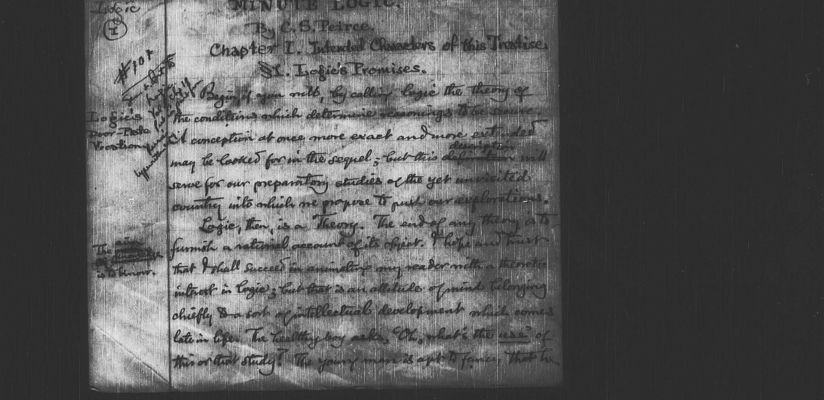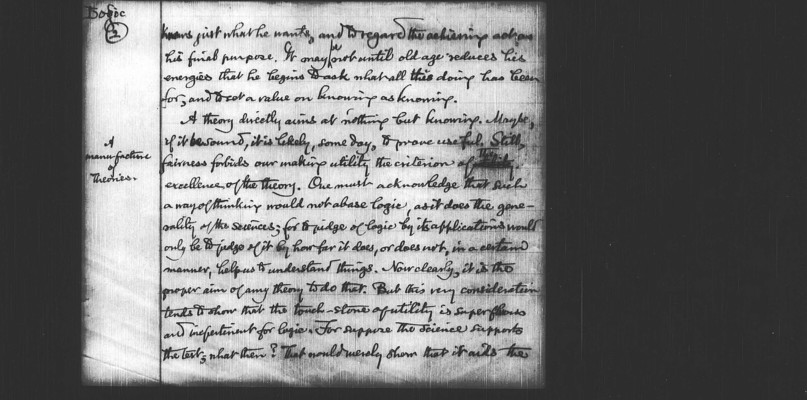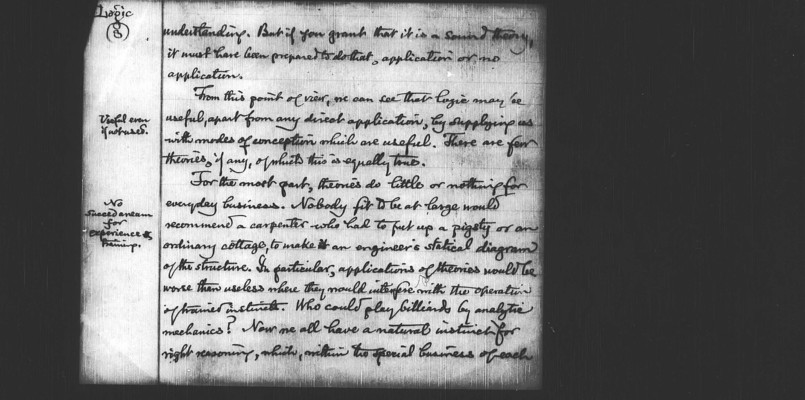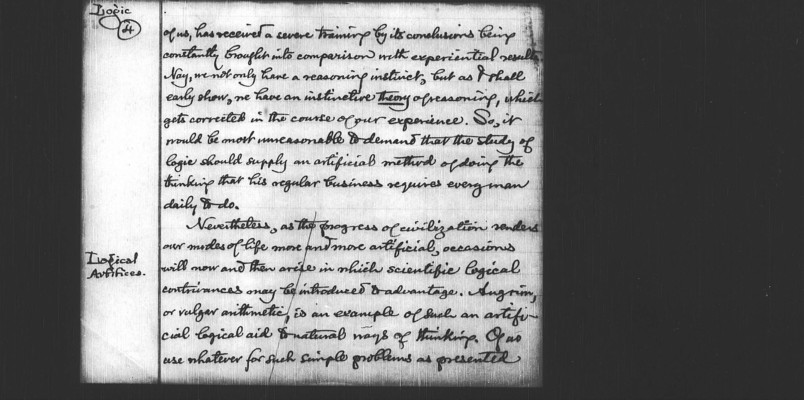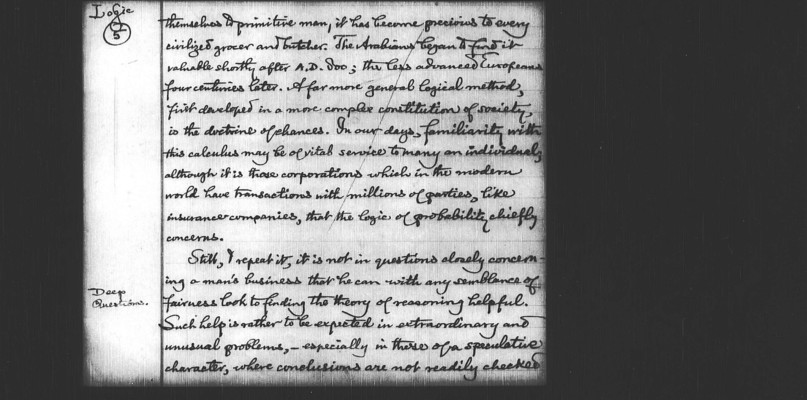Pages
1
{Left margin, top left of page: "Logic 1" Then: "#107 Gen[...] Int to Logic. Vol [..] Chp 1[.] Put in part for[.]. Raised typewritten copy." Then: "Logic's Door-Plate Vocation."}
MINUTE LOGIC
By C.S. Pierce
Chapter I. Intended Characters of this Treatise
§1. Logic's Promises.
Begin, if you will, by calling logic the theory of the conditions which determine reasonings to be secure. A conception at once more exact and more extended may be looked for in the sequel; but this definition description will serve for our preparatory studies of the yet unvisited country into which we propose to push our explorations.
{Left margin, next to the first sentences of the paragraph below: "The aim of knowledge is to know."}
Logic, then , is a Theory. The end of any theory is to furnish a natural account of its object. I hope and trust that I shall succeed in animating my reader with a theoretic interest in logic; but that is an attitude of mind belonging chiefly to a sort of intellectual development which comes late in life. The healthy boy asks, 'Oh, what's the use' of this or that study? The young man is apt to fancy that he
2
{Left margin, top of page: "Logic 2"}
knows just what he wants, and to regard the achieving act as his final purpose. It may be not until old age reduces his energies that he begins to ask what all this doing has been for, and to see a value on knowing as knowing.
{Left margin, next to the first sentences of the paragraph below: "A manufacture of theories."}
A theory directly aims at nothing but knowing. Maybe, if it be sound, it is likely, some day, to prove useful. Still, fairness forbids our making utility the criterion of utility the excellence of the theory. One must acknowledge that such a way of thinking would not abase logic, as it does the generality of the sciences; for to judge of logic by its applications would only be to judge of it by how far it does, or does not , in a certain manner, help us to understand things. Now clearly, it is the proper aim of any theory to do that. But this very consideration tends to show that the touch-stone of utility is superfluous and impertinent for logic. For suppose the science supports the test; what then? That would merely show that it aids the
3
{Left margin, top of page: "Logic 3"}
understanding. But if you grant that it is a sound theory, it must have been prepared to do that, application or no application.
{Left margin, next to the paragraph below: "Useful even if not used."}
From this point of view, we can see that logic may be useful, apart from any direct application, but supplying us with modes of conception which are useful. These are few theories, if any, of which this is equally true.
{Left margin, next to the paragraph below: "No succedaneum for experience as training."}
For the most part, theories do little or nothing for everyday business. Nobody fit to be at large would recommend a carpenter who had to put up a pigsty or an ordinary cottage, to make an engineer's statical diagram of the structure. In particular, applications of theories would be worse than useless where they would interfere with the operation of trained instinct. Who could play billiards by analytic mechanics? Now we all have a natural instinct for right reasoning, which, within the special business of each
4
{Left margin, top of page: "Logic 4"}
of us, has received a severe training by its conclusions being constantly brought into comparison with experiential results. Nay, we not only have a reasoning instinct, but as I shall early show, we have an instinctive theory of reasoning, which gets corrected in the course of our experience. So, it would be most unreasonable to demand that the study of logic should supply an artificial method of doing the thinking that his regular business requires every man daily to do.
{Left margin, next to the paragraph below: "Logical Artifices."}
Nevertheless, as the progress of civilization renders our modes of life more and more artificial, occasions will now and then arise in which scientific logical contrivances may be introduced to advantage. Ang[...], or vulgar mathematics, is an example of such an artificial logical aid to natural ways of thinking. Of no use whatever for such simple problems as presented
5
{Left margin, top of page: "Logic 5"}
themselves to primitive man, it has become precious to every civilized grocer and butcher. The Arabians began to find it valuable shortly after A. D. 800; the less advanced Europeans four centuries later. A far more logical method, first developed in a more complete constitution of society, is the doctrine of chances. In our days, familiarity with this calculus may be of vital service to many an individual, although it is those corporations which in the modern world have transactions with millions of parties, like insurance companies, that the logic of probability chiefly concerns.
{Left margin, next to first sentence of paragraph below: "Deep Questions."}
Still, I repeat it, it is not in questions closely concerning a man's business that he can with any semblance of fairness look to finding the theory of reasoning helpful. Such help is rather to be expected in extraordinary and unusual problems,--especially in those of a speculative character, where conclusions are not readily checked
